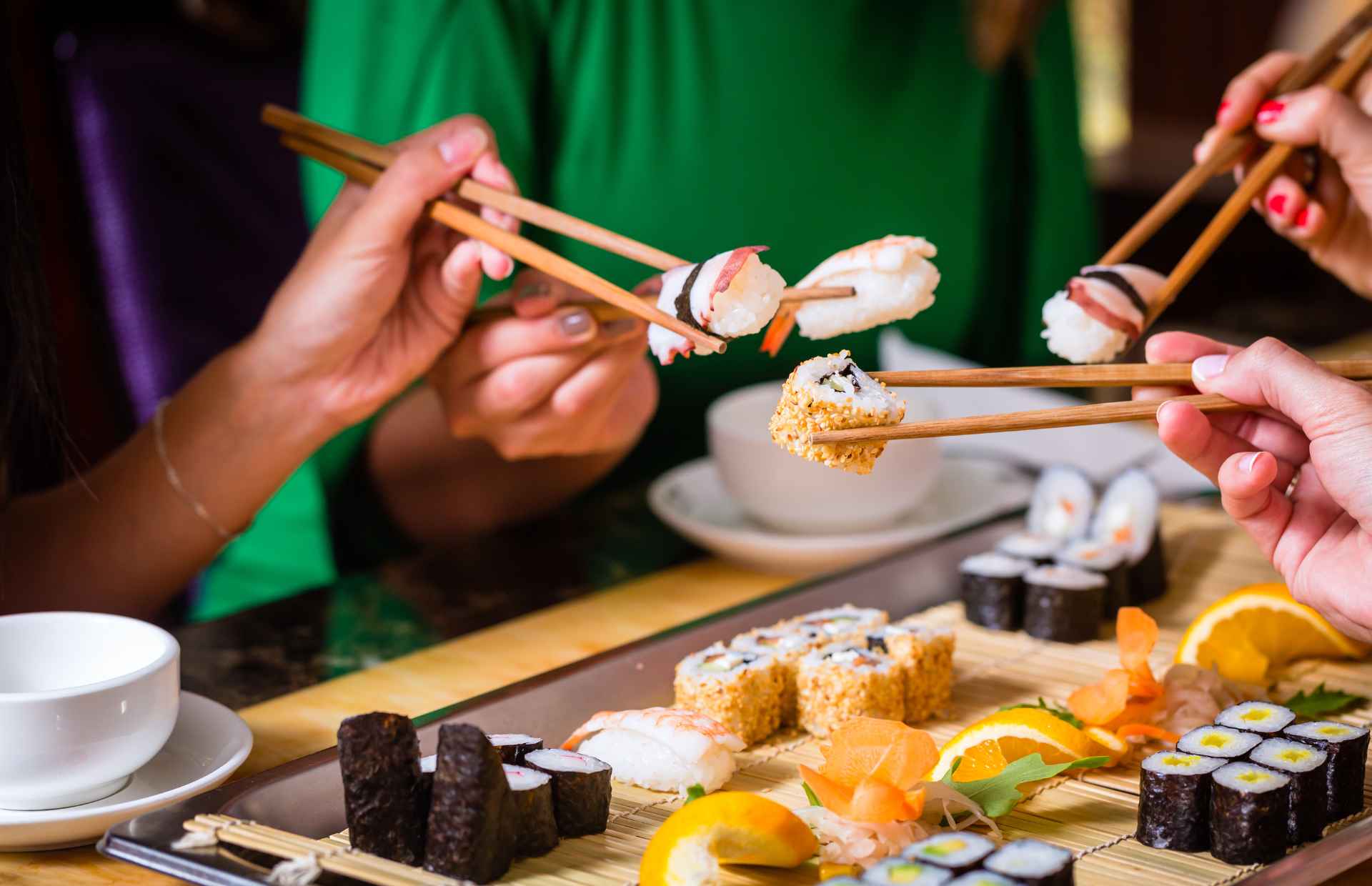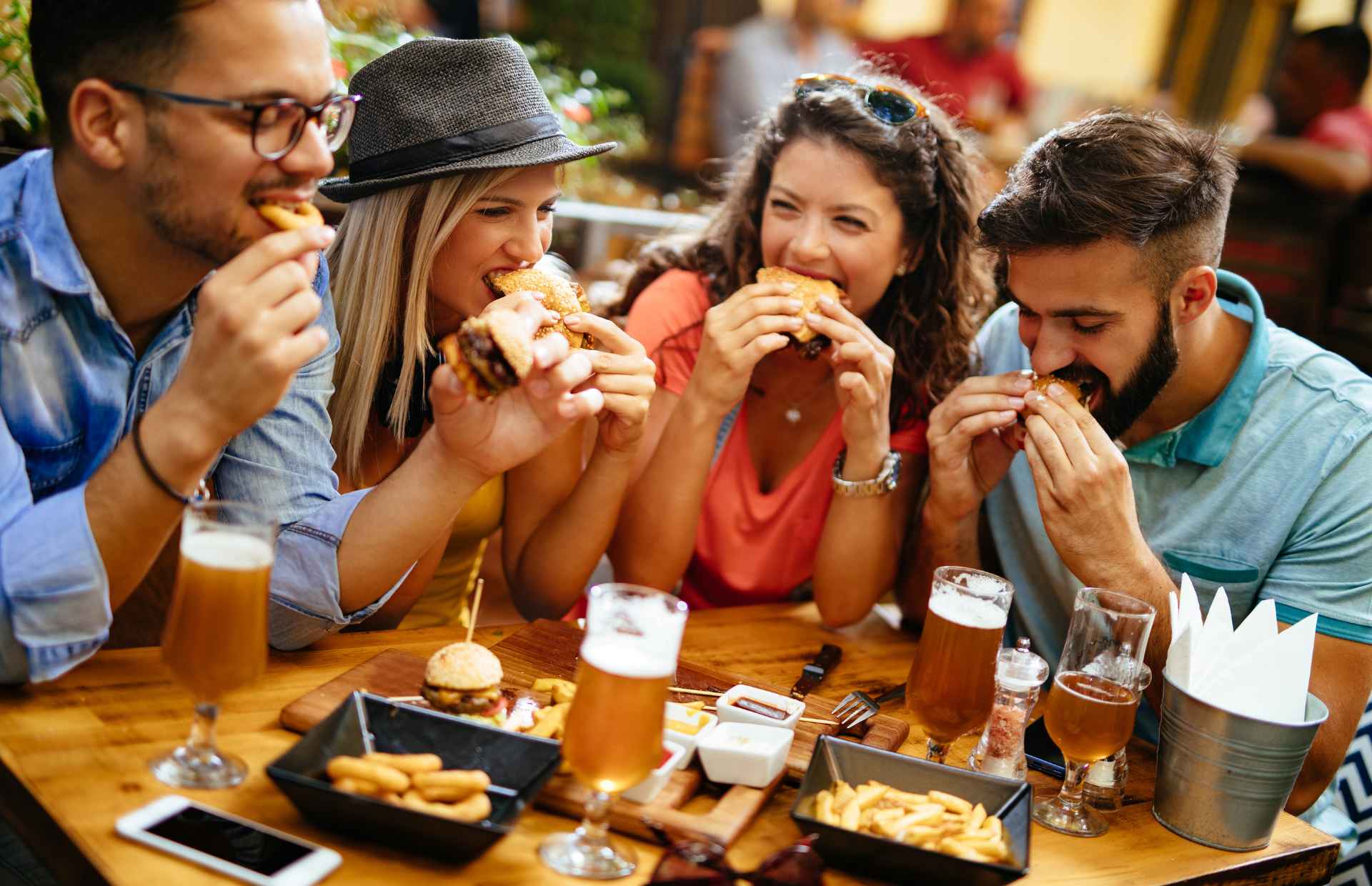

Guide To Mindful Eating
In today?s TikTok crazy world where instant gratification is everything, we often eat without really thinking about what?s on our plate, how much we?re consuming, or even how our body feels during and after a meal.
We?re juggling work, scrolling through our phones, or binge-watching a show while we eat ... turning something that should be nourishing and enjoyable into an automatic and often unconscious act.
In this blog post, we're going to talk about the dangers of eating this way and what you can do to eat more mindfully.
What is Mindful Eating?
Mindful eating is a way of slowing down and bringing your full attention to the experience of eating. It encourages you to be present, to notice the tastes, textures, and smells of your food, and to truly listen to your body?s signals of hunger and fullness. It's not a diet or a way to restrict yourself, but rather a tool to create a healthier, more balanced relationship with food.
Personally, I used to struggle with binge eating. I often found myself inhaling meals without even realising it, only to feel overstuffed and unsatisfied afterwards. It wasn?t until I started practising mindful eating that I realised how much more enjoyable?and satisfying?eating could be when I actually paid attention to it.
The Difference Between Mindful Eating and Mindless Eating
We?ve all experienced the difference between mindless and mindful eating, though we might not have been aware of it at the time.
Mindless eating happens when you're distracted?eating a whole bag of chips while watching TV, for instance, only to look down and realise it's empty without any memory of how much you ate. On the other hand, mindful eating is when you?re fully engaged with the food in front of you, paying attention to each bite, and noticing when your body is signalling that you?ve had enough.
It?s easy to fall into mindless eating habits, especially when food is so readily available. But mindful eating encourages us to tune in, not just to the food, but also to the feelings and emotions we associate with eating.
The Dangers of Not Eating Mindfully
When we don?t practice mindful eating, we often fall into patterns that can have negative effects on our physical and mental health. Here are some of the risks associated with not eating mindfully:
Overeating
Eating without paying attention often leads to consuming more food than our bodies actually need. Whether it?s mindlessly snacking while watching TV or rushing through a meal, eating without awareness makes it easy to overeat without realising it.
Emotional Eating And Binge Eating
When we disconnect from our bodies? signals and eat mindlessly, we?re more likely to turn to food as a coping mechanism for stress, anxiety, or other emotions. This can result in a harmful cycle of emotional eating or binge eating that is hard to break.
Poor Digestion
Eating quickly or while distracted can impair digestion. When we eat too fast, we don?t give our bodies enough time to properly process food, which can lead to discomfort, bloating, or indigestion.
Weight Gain
Consistently overeating or emotionally eating can contribute to weight gain over time. Not paying attention to hunger and fullness signals can lead to excessive calorie consumption, which in turn may lead to unhealthy weight gain and related health problems like diabetes, heart disease, or high blood pressure.

How Mindless Eating Leads to Overeating and Binge Eating Tendencies
Mindless eating is often a precursor to overeating and, in some cases, binge eating. When we eat without paying attention to our hunger cues or the amount of food we?re consuming, we lose touch with what our bodies actually need.
Overeating happens when we eat more than we need to feel satisfied. It?s easy to do this when we?re distracted by our phones, watching TV, or eating in a hurry. Without paying attention, we miss the signals that our body sends to let us know we?re full. Over time, this can lead to consistent overeating and weight gain.
Binge eating, on the other hand, is more extreme. It involves consuming large amounts of food in a short period, often to the point of discomfort. For people who struggle with binge eating disorder (BED), these episodes are accompanied by feelings of guilt, shame, or loss of control. Mindless eating exacerbates binge eating tendencies because the disconnection from hunger and fullness cues makes it harder to stop once a binge begins.
Mindful eating can play a significant role in breaking this cycle. By focusing on hunger cues, slowing down, and enjoying the eating experience, people can start to regain control over their eating patterns and reduce episodes of binge eating.
Why Mindful Eating Matters
The benefits of mindful eating go beyond simply enjoying your food more. This practice can help you improve your physical health, mental well-being, and overall relationship with food. It teaches you to eat according to your body's natural hunger and fullness cues rather than external triggers like stress or boredom.
But why does mindful eating matter so much? Mindful eating has a number of physical and mental benefits. We'll break those down in the next section.
The Physical and Mental Health Benefits of Mindful Eating
Mindful eating is not just about food; it impacts every aspect of how we relate to our bodies and our emotions. Here are some key benefits:
Improved Digestion
When we rush through meals, our bodies don?t have enough time to digest food properly. We may end up eating too fast, not chewing enough, or overwhelming our digestive system. By slowing down and eating mindfully, you give your digestive system a chance to keep up. This can lead to fewer digestive issues, like bloating or discomfort after eating.
Better Weight Management
When you eat mindfully, you?re more likely to notice when you're full, which can help you avoid overeating. Instead of eating out of habit or emotional triggers, you're tuning in to your body?s signals. Over time, this can support a healthier weight without the need for restrictive diets.
Reduced Stress Around Food
For many people, eating can be a source of anxiety. Whether it?s about making the ?right? food choices, worrying about weight gain, or stressing about portion control, food can feel overwhelming. Mindful eating can reduce this stress by shifting the focus from external pressures to internal cues. You?re no longer trying to follow rigid rules; instead, you?re listening to what your body needs.
Enhanced Enjoyment of Food
How often do we truly savour the taste of our food? Mindful eating teaches us to slow down and appreciate the flavours, textures, and smells of our meals. You may find that food becomes more enjoyable when you?re fully present with it. In my own experience, the meals I used to rush through now feel more satisfying and fulfilling because I take the time to enjoy each bite.

How to Practice Mindful Eating
Now that we understand the benefits, let?s explore how to actually incorporate mindful eating into our daily lives. Here are some simple, practical strategies:
Eat Without Distractions
This is one of the easiest ways to start practising mindful eating. Turn off the TV, put down your phone, and step away from the computer while you eat. When you?re not distracted, you can focus fully on your food. It'll feel super strange at first, and you might even have the compulsive urge to do something whilst you eat to distract. But if you push through this feeling, you'll adapt quickly and notice a world of difference within just a few days. When I first started trying to practice mindful eating, it took me about 2 weeks to finally feel comfortable eating without looking at a screen.
Slow Down And Chew More
Take your time with each bite and put your cultery down between each mouthful. Notice how the food tastes, how it feels in your mouth, and how your body responds. And focus on actually chewing your food more. Chew until your food is as close to liquid as possible. (Remember the saying, "Drink your food and chew your water"). Doing so will improve the digestion of your food and reduce bloating. Slowing down and chewing more can also help prevent overeating because your brain will have time to register that you're full.
Listen to Your Hunger Cues
Before eating, ask yourself: ?Am I really hungry?? Mindful eating encourages you to eat when you're truly hungry and stop when you're full, rather than eating out of habit or boredom. As you practice mindful eating, you'll become more attuned to your body's natural hunger and fullness signals. When I used to binge eat, my hunger and fullness cues were all over the place. It took about 2 months of mindful eating until I started 'hearing' my body's hunger cues again.
Pay Attention to Your Emotions
Sometimes, we eat to cope with stress, sadness, or even boredom. Mindful eating helps you recognise when you're eating for emotional reasons rather than physical hunger. By paying attention to your emotions, you can develop healthier coping strategies that don?t involve food.
The Japanese Concept of 'Hara hachi bun me'
One interesting cultural approach that aligns perfectly with mindful eating is the Japanese practice known as Hara hachi bun me (????). This phrase translates to ?eat until you are 80% full,? and it?s a traditional Okinawan saying that encourages people to stop eating before they feel completely stuffed.
In Okinawa, Japan, one of the regions with the longest life expectancy in the world, this practice is a key component of their diet and lifestyle. The idea is that by stopping before you're completely full, you avoid overeating and give your body time to register fullness. This ties directly into the principles of mindful eating, where the goal is to eat with intention and listen to your body?s cues.
As someone who spent some time living in Okinawa and other places in Japan, it was amazing to see how mindful the Japanese people are when eating. Watching them eat is completely different to how we eat in the Western world.
By practicing Hara hachi bun me, you can become more attuned to when you're satisfied rather than stuffed, promoting better digestion, weight management, and overall health. It?s a simple yet effective approach that can help you incorporate mindful eating into your everyday life.

Overcoming Challenges with Mindful Eating
Like any new habit, mindful eating takes practice and patience. It?s easy to slip back into old habits, especially in a world full of distractions. However, here are some common challenges and how to overcome them:
Breaking the Multitasking Habit
One of the biggest challenges people face when starting mindful eating is breaking the habit of multitasking during meals. Start by setting small goals, like dedicating just one meal a day to eating without distractions. Or if you're eating with friends and family, get everyone to put their devices away and be fully present in the conversation.
Emotional Eating And Bingeing
If you tend to binge eat or eat for emotional reasons, it can be hard to shift to mindful eating. Try keeping a food & mood journal to track when and why you eat. You should record what you ate, as well as how you were feeling before, during and after each meal. After a week or two of doing this, you will start to pick up on patterns. Knowing these patterns will help you to put the correct strategies in place to reduce binge eating and eat more mindfully.
You can also try and break the cycle by practising other stress-reducing techniques like meditation, deep breathing, or talking to a friend before turning to food for comfort.
Mindful Eating vs Dieting
It?s important to note that mindful eating is not the same as dieting. While dieting often involves strict rules, restrictions, and a focus on external goals like weight loss, mindful eating is about connecting with your body and responding to its needs.
You?re not focused on what you "should" or "shouldn?t" eat?instead, you're paying attention to what your body is telling you. This shift in mindset can be incredibly freeing and can lead to a healthier, more positive relationship with food.
How Mindful Eating Ties Into Binge Eating Recovery
Mindful eating plays a crucial role in recovering from binge eating. When someone struggles with binge eating, they often feel a lack of control around food, consuming large amounts in a short period of time, sometimes to the point of physical discomfort. This can lead to feelings of guilt, shame, and stress, which only perpetuates the cycle.
In our Undiet Program, we incorporate mindful eating into the recovery process to help break this destructive cycle by promoting a healthier, more balanced approach to food. Rather than focusing on restriction or "good" vs. "bad" foods, mindful eating encourages individuals to listen to their bodies, which helps restore a sense of control and trust in the eating experience.
Reconnecting With Hunger and Fullness Cues
Binge eating often causes people to become disconnected from their natural hunger and fullness signals. It?s easy to lose touch with when you're genuinely hungry or satisfied, leading to overeating or bingeing. As talked about earlier in this post, mindful eating helps restore this connection by encouraging you to pause, check in with your body, and assess how hungry or full you are before and during a meal.
For those recovering from binge eating, this is a powerful tool. It can help break the habit of eating in response to emotions or external triggers by shifting the focus back to physical hunger. Personally, I?ve found that this practice has made me more aware of how different foods make me feel?not just in the moment, but hours later. It?s allowed me to make more thoughtful choices without feeling like I?m restricting myself.
Creating a Non-Judgmental Approach to Eating
One of the most difficult aspects of binge eating recovery is overcoming the negative emotions that often accompany it?guilt, shame, or feeling like a failure after a binge episode.
Mindful eating promotes a non-judgmental attitude toward food, helping individuals move away from the all-or-nothing mentality that often leads to binges. Instead of seeing a food choice as ?bad? or ?good,? mindful eating encourages you to experience food without attaching moral judgments to it.
By practising self-compassion and curiosity rather than judgment, you can reduce the guilt associated with eating. This helps to gradually unravel the emotional triggers that drive binge eating episodes. In my experience, simply allowing myself to enjoy food without the added pressure of perfectionism made me feel more in control and less likely to binge.
Managing Emotional Eating
Emotional eating is a major component of binge eating disorder. Many people use food as a way to cope with negative emotions like stress, sadness, or boredom. Mindful eating teaches you to recognise when you're eating in response to emotions rather than hunger.
In recovery, this means learning to pause before reaching for food and asking yourself, "Am I truly hungry, or am I looking to soothe an emotion?" If it's the latter, you can explore other ways to manage your emotions, whether it?s through journaling, talking to a friend, or practising mindfulness techniques like deep breathing or meditation.
When I began this process myself, I was surprised by how often I reached for food out of boredom or stress. Simply acknowledging this allowed me to explore healthier ways to cope without relying on food as a crutch.

Conclusion: Embracing Mindful Eating for a Healthier Life
Mindful eating is more than just a strategy for improving your relationship with food?it?s a way of reconnecting with your body, your emotions, and your overall well-being. Whether you're looking to recover from binge eating, manage stress, or simply enjoy your meals more, mindful eating offers a path forward.
As you begin your mindful eating journey, remember that it?s not about being perfect, and it?s certainly not about following rigid rules. It?s about learning to listen to your body, trust your instincts, and approach food with curiosity and kindness. And while it can be challenging at first, with practice, it becomes a rewarding and transformative journey.
By incorporating principles like Hara hachi bun me and embracing mindful eating strategies, you can develop a more balanced and positive relationship with food, one that nourishes both your body and your mind.
If you're curious to learn more about how mindful eating can support binge eating recovery or improve your overall well-being, there are many great resources available, including books like "The Mindful Eating Workbook" by Vincci Tsui or "The Joy of Half a Cookie" by Jean Kristeller.